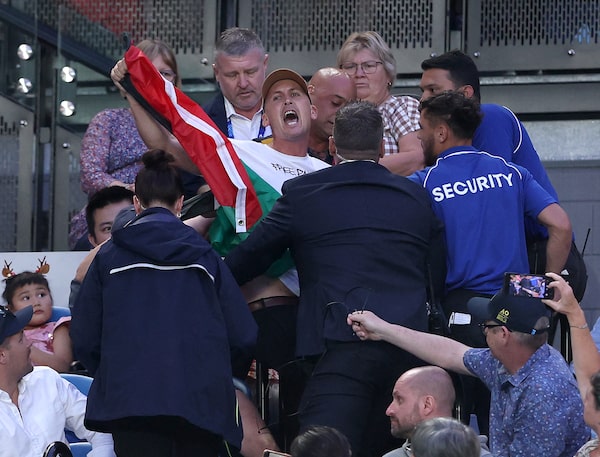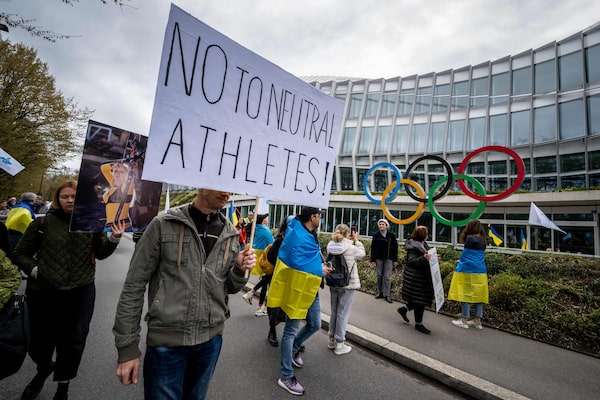Tyrone McKenna is a boxer from Belfast who founded Irish Sport for Palestine, a group calling for Israeli athletes to be banned from the Olympics and other major sporting events, just as Russians have been.Anna Liminowicz/The Globe and Mail
It didn’t take long for 20-year-old German soccer standout Yusuf Kabadayi to feel the wrath of his superiors at the Bundesliga 2 club Schalke FC after he posted a short message on Instagram, “I stand with Palestine.”
Schalke’s sports director quickly reprimanded Kabadayi, who is of Turkish descent, and within hours he’d deleted the message and issued an apology. Those who supported his message were outraged and noted that Bayern Munich’s goalkeeper, Daniel Peretz, who is Israeli, faced no similar scolding for his Instagram post, “I stand with Israel.”
The contrasting posts and the subsequent fallout are just two examples of the impact the war in Israel is having on sports around the world and how players, fans and officials are divided over how to respond.

Security officers at the Australian Open removes a pro-Palestinian protester from Jan. 27's women's singles final match in Melbourne.MARTIN KEEP/AFP via Getty Images
The Israel-Palestine conflict has long been intertwined with sports. For years athletes from several Arab nations have refused to compete against Israelis in a show of support for Palestine. And Israelis will never forget the murder of 11 members of their Olympic team during the 1972 Munich Games by a group affiliated with the Palestine Liberation Organization.
As the war in Israel drags on, those divisions have widened and led to some dramatic outbursts on and off the field.
Last fall thousands of fans of Glasgow’s Celtic soccer team defied the club’s plea and waved a flurry of Palestinian flags during a Champions League match, prompting a £15,200 fine (about $25,000) from European soccer officials.
In January, two Israeli soccer players in Turkey were dismissed by their top division clubs for expressing support for Israel. And the International Ice Hockey Federation recently tied itself in knots after banning Israeli teams from major competitions and then reversing its decision days later in the wake of fierce criticism.
Pro-Palestinian and Irish nationalist murals stand side by side in Belfast, where Mr. McKenna lives.Anna Liminowicz/The Globe and Mail
“Some things are bigger than sport,” said Tyrone McKenna, a British boxer in Belfast who has joined a campaign called Irish Sport for Palestine, which includes 200 athletes from a wide variety of sports including basketball, soccer and rugby. The group recently released an open letter calling for an immediate ceasefire as well as “an international investigation into Israel’s violation of the Olympic charter” and sanctions against Israeli athletes.
McKenna lives in west Belfast, a nationalist area that has long been sympathetic to the Palestinian people. That affinity has only deepened since the war began in October and Palestinian flags and murals can be seen throughout McKenna’s neighbourhood. “We’re a city that knows all too well what oppression is and we went through what we went through,” he said referring to the decades of sectarian violence in Northern Ireland. “Palestine has a very similar history.”
He and others want Israel banned from all sports competitions including the Olympics, much like Russia and Belarus. “Irish boxers aren’t allowed to fight Russian or Belarusian fighters because of the war over in Ukraine, so I find it very strange that they’re still allowing us to fight Israeli boxers,” McKenna said.
The International Olympic Committee has insisted that the ban on Russian and Belarusian athletes was a consequence of Russia’s full-scale invasion occurring during the Winter Olympics in 2022, which constituted a violation of the traditional Olympic truce. Russian and Belarusian teams have been banned from the Paris Games this summer but athletes from those countries can compete as neutrals as long as they have not actively supported the war in Ukraine or served in the military. There has been no indication from the IOC that Israeli athletes will face any prohibitions.
As the death toll in Gaza soars above 27,000, according to Gaza’s Health Ministry, and the humanitarian crisis worsens, the campaign to ban Israel from the Olympics has grown louder.
“The IOC has really backed themselves into a corner by setting that precedent with Russia,” said Karim Zidan, an Egyptian-Canadian journalist who covers the intersection of sports and politics. “The IOC’s lack of willingness to take any action against Israel, and the gaslighting of making us think that these situations aren’t similar, I think is hypocritical.”
Zidan said Israel has more powerful allies among western nations than Russia and he accuses the IOC of bowing to political pressure. “What they refuse to admit is that this is a political decision,” he said.
He also expressed dismay that while the major professional leagues in North America – the NHL, NBA, NFL and MLB – issued statements in support of Israel when the war started, they have been silent about the plight of the Palestinians. “It’s another show of hypocrisy that they couldn’t even bring themselves later to offer their condolences for the deaths in Palestine and try, in a non-politicized sense, to call for a humanitarian ceasefire,” he said.

Ukrainians protest outside the International Olympic Committee headquarters in Lausanne, Switzerland, to oppose a proposed road map to return some Russian athletes to competition under a neutral flag.FABRICE COFFRINI/AFP via Getty Images
Calls for an Olympic ban and attempts to equate Russia’s actions in Ukraine with Israel’s in Gaza don’t sit well with many people involved in Israeli sports. They point out that Russia’s invasion was unprovoked while Israel’s military intervention came after the country was attacked by Hamas fighters, who killed 1,200 people and took more than 200 hostages.
“The comparison with Russia is backwards,” said Israeli-Canadian businessman Sylvan Adams, who co-owns the Israel – Premier Tech cycling team. “Ukraine was attacked by Russia, just as Israel was attacked by Gazan Palestinians on Oct. 7. Both Ukraine and Israel are fighting defensive wars of necessity.”
Adams said it was ludicrous to suggest that Israel should be banned from the Olympics. “We are fighting brutal Islamist terror groups on behalf of the rest of the world,” he said. “We are the first line of defence against Islamism for the world, just as Ukraine is the first line of defence for Europe against Russia.”
He added that Israel – Premier Tech plans to compete in the Tour de France and other major races as usual this season. “We’re not a political organization. We are a cycling team building bridges and promoting peace wherever we ride,” he said.
The team has taken some precautions for rider safety. It has distributed blank shirts without a team logo for riders to wear when they train alone. But Adams said that during races, the team’s kit will continue to feature the club’s name and logo, which includes a Star of David.

Eliezer Sherbatov, then captain of Israel's national hockey team, trains in 2020 with Unia Oswiecim, a club in the Polish town where the Auschwitz concentration camp was located.WOJTEK RADWANSKI/AFP via Getty Images
Israeli hockey player Eliezer Sherbatov knows all too well how brutal Russia’s full-scale invasion has been and he, too, doesn’t buy the comparison with Israel.
Sherbatov, 32, lives in Montreal and is a veteran of the Israeli national team. He also has Russian-Ukrainian ancestry and he was playing for a team in Mariupol when Russia launched its invasion and shelled the city.
“I understand the feeling. I understand what’s happening. I’ve lived through that,” he said. “Israel is a bit of a different scenario than Russia. Hamas attacked Israel on Oct. 7 and we’re defending our land.”
Nonetheless, Sherbatov says politics has no place in sports and he wants to see Russian teams competing at the Olympics and other events such as the world junior hockey championship.
His experience in Ukraine has also made him a strong advocate for peace. “Whether it’s Palestinians, whether it’s Israelis, for me it’s complete nonsense that civilians have to go through that kind of stuff,” he said. “All I want is peace between the Palestinians and the Israelis.”
The Israel-Hamas war goes global: More reading
Half a world away from Gaza, a Canadian play about an Israeli first responder is polarizing the B.C. theatre scene. J. Kelly Nestruck, The Globe’s theatre critic, joined The Decibel to explain how the controversy began. Subscribe for more episodes.
In Vancouver, Jewish and Palestinian restaurants try to find a new normal
Sheema Khan: With Islamophobic incidents on the rise, Muslim Canadians are worried
Marsha Lederman: For Jewish Canadians, the number of places we feel unwelcome keeps growing